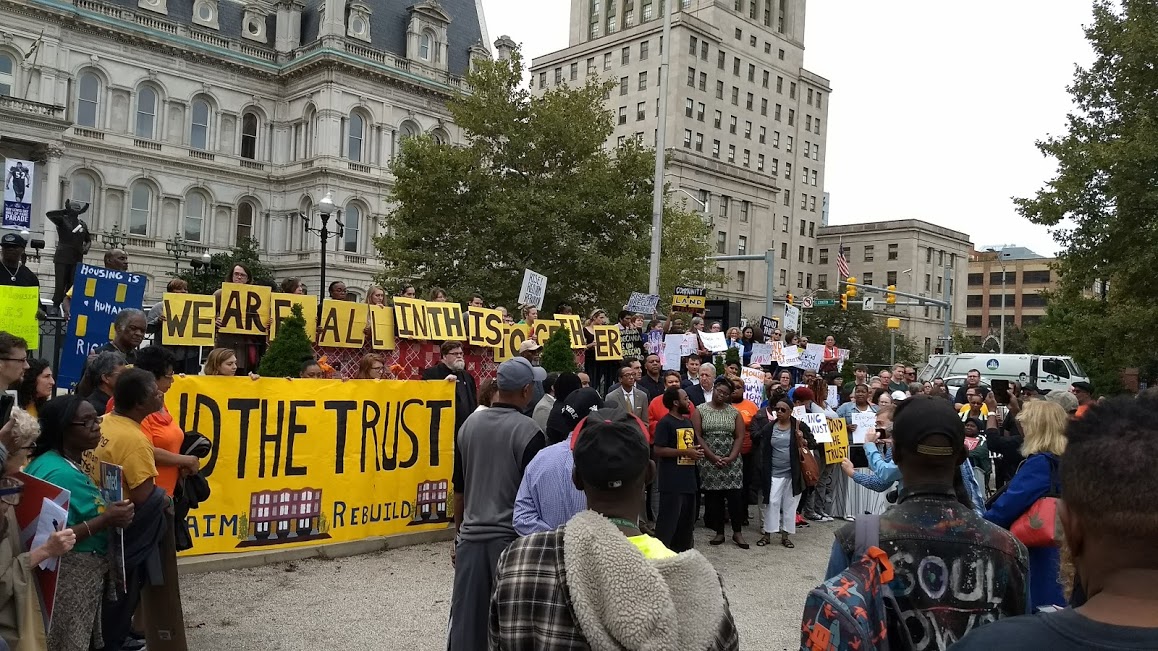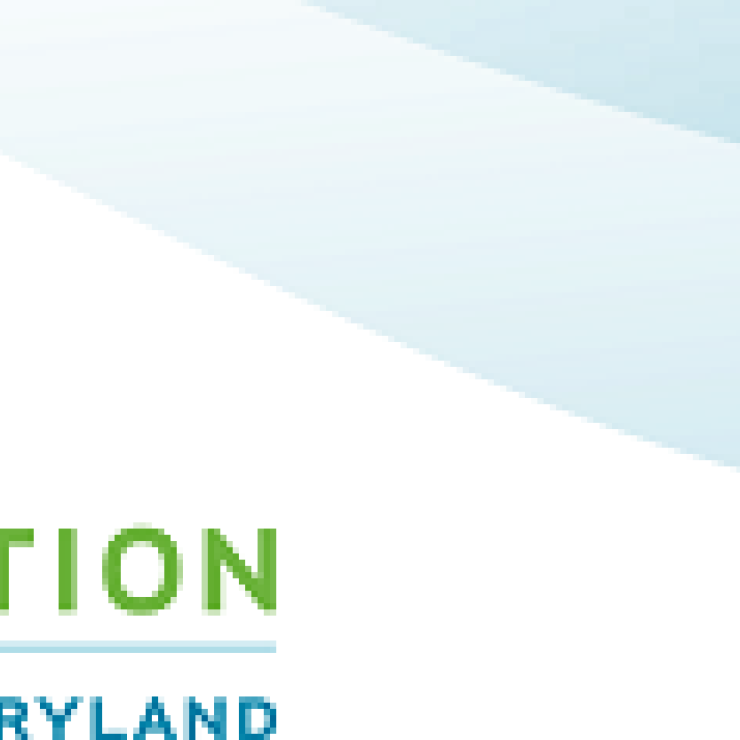
This morning, the Baltimore City Council's Taxation, Finance, and Economic Development Committee held a hearing on Bill 18-0221 – Recordation and Transfer Taxes – Surtax – Dedicating Proceeds to Affordable Housing Trust Fund - more popularly known as the Fund the Trust Act. This bill would raise $13 million for the city's Affordable Housing Trust Fund per year by slighly increasing fees on property transfers above $1 million, making it possible for Baltimore to fill a gap in housing availability that the housing market cannot meet by creating deeply affordable housing in Baltimore.
Housing justice is environmental justice, and we were proud to deliver this testimony in support of the bill and rally with over one hundred Baltimore residents before the hearing.

September 25, 2018
Dear Taxation, Finance, and Economic Development Committee Members,
Clean Water Action is a national environmental advocacy organization with over 8,000 members within Baltimore City. We work for swimmable, fishable waters in Maryland, for safe drinking water, and for environmentally healthy communities. Because of this commitment to creating healthy communities, we are writing in strong support of City Council Bill 18-0221 – Recordation and Transfer Taxes – Surtax – Dedicating Proceeds to Affordable Housing Trust Fund. The Affordable Housing Trust Fund is a crucial tool for Baltimore’s residents to build stronger, greener, more resilient, and more sustainable communities through building affordable housing, community-controlled revitalization of Baltimore neighborhoods, and development without displacement. Following through on Baltimore City’s promise to create the Affordable Housing Trust Fund is critical to creating healthy neighborhoods where everyone can thrive and creating a city that will be resilient to climate change and fair to all its residents.
Bill 18-0221 would raise an estimated $13 Million dollars annually to create, preserve, and maintain affordable housing for city residents at or below 50% of area median income. Creating permanently affordable housing for individuals and families at this income level is absolutely crucial to protect human rights in a rapidly changing city, as both economic pressures and environmental catastrophes risk displacing longtime residents from their neighborhoods and worsening their health due to substandard housing stock.
Climate change threatens to bring Baltimore extreme weather – more hurricanes, more intense rainstorms, more extreme heat and cold. These conditions will only exacerbate the housing pressures that Baltimoreans are already feeling, from the impacts of extreme weather on homeless people in Baltimore, to the impacts on families living in housing that is not resilient to the weather. Recent data suggests that 1/3 of all rental properties in Baltimore are considered substandard, for example with leaking roofs, flooding basements, moldy walls, overflowing sewage pipes, and other conditions that are hazardous to residents’ health. Since we know these conditions will continue to worsen as climate change intensifies in the coming decades, now is the time to invest in developing strong, resilient housing that will protect Baltimore’s residents. Bill 18-0221 is an excellent policy mechanism to do that.
It is anticipated that in Baltimore, $13 million annually would support the development of 6 community land trusts and create or preserve more than 400 affordable housing opportunities each year. With these funds, Baltimore City has the incredible opportunity to put neighborhood residents who have fought for their neighborhoods for years in charge of how their neighborhoods are redeveloped through community land trusts. Members of land trusts across the city – many of whom have been engaged in environmental campaigns in their communities, from fighting trash incinerators and crude oil train shipments to developing community gardens and local food solutions – are already engaging in conversations around how to make homes developed through the Affordable Housing Trust Fund environmentally friendly and healthy for their residents. Land trusts are especially well positioned to use economies of scale to bring energy efficiency, stormwater infrastructure, and solar power to their homes.
Old Baltimore rowhomes leak hot air in the summer and cold air in the winter, and inefficient appliances cost their residents money. Land trusts homes can be renovated to be energy efficient with insulation, new windows, energy-efficient appliances, modern lightbulbs, and efficient heating and cooling for water; by making these improvements accessible to low-income homebuyers at or below 50% AMI, land trusts can reduce their energy costs by 20% - saving $341 per year and reducing their energy usage by almost 1,500 kWh each year. On average, electricity consumes seven times more of a low-income household’s budget than a high-income household’s budget. Ensuring that land trust homes use as little energy as possible will help ensure that first-time homeowners in these homes can stay there. With support from the Affordable Housing Trust Fund, land trusts can invest in these improvements as they redevelop homes, making them more sustainable and more deeply affordable both to purchase and to live in. And just two homes with these improvements prevent as much climate-change-causing pollution each year as taking a car off the road – cleaning up the air for all Baltimoreans.
Likewise, land trusts provide a mechanism for building stormwater infrastructure into Baltimore’s neighborhoods. Using the economies of scale inherent in redeveloping multiple land trust homes in close proximity and leveraging grant funding to match the city’s investment can make it possible for land trust homes to incorporate rain barrels, green roofs, stormwater planters, tree plantings, depaving projects, and more. Projects like these provide enormous benefits to the environment and to residents, but are often out of reach of low income residents due to their cost. But by installing stormwater infrastructure all at once in sets of nearby homes, land trusts could reduce the costs of this infrastructure by 15% - stretching available grant money to achieve the maximum water quality benefit. And once they’re in place, these designs will save land trust residents money each month: credits are available to reduce water bills in homes with stormwater retention. These improvements will also help our stormwater and sewer infrastructure handle the increased rainfall and intense storms that Baltimore is experiencing this year and that will only increase with climate change, reducing instances of flooding and sewage back-ups for neighbors.
Funding the Affordable Housing Trust Fund will help create a more fair and equitable Baltimore that puts our poorest and most vulnerable residents in a position to improve their own lives, take charge of their own neighborhoods’ redevelopment, and create resilient communities that can weather the intense storms and other threats we know will increase with climate change. For these reasons, Clean Water Action urges you to vote in favor of City Council Bill 18-0221 – Recordation and Transfer Taxes – Surtax – Dedicating Proceeds to Affordable Housing Trust Fund to create sustainable funding for our city’s Affordable Housing Trust Fund at $13 million each year. Thank you for your consideration.
Sincerely,
Jennifer Kunze
Maryland Program Organizer
Clean Water Action


